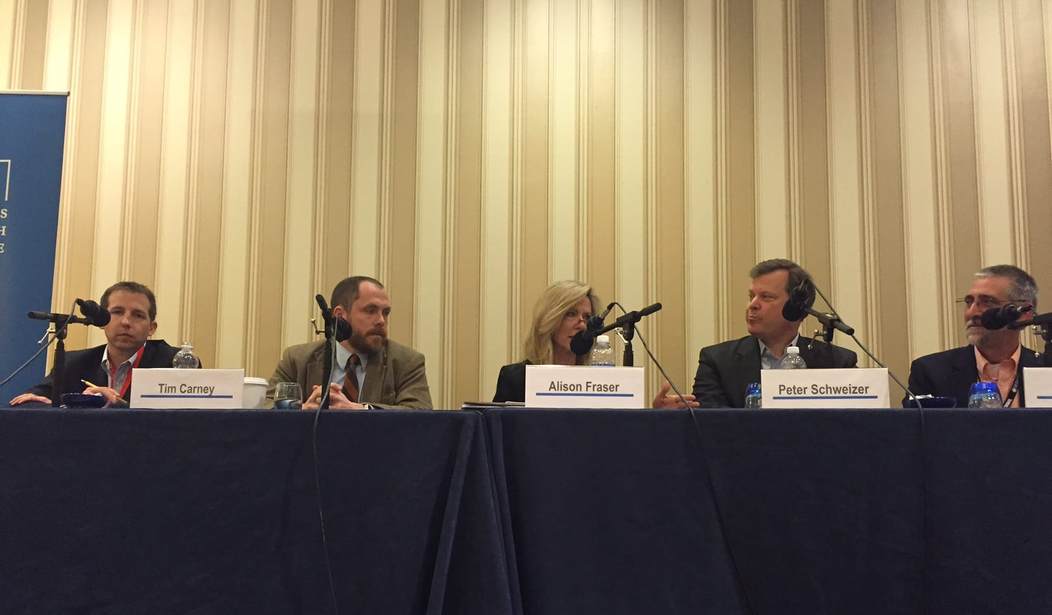At a panel on Thursday at the Conservative Political Action Conference (CPAC), scholars and journalists channeled one of Bernie Sanders’ key issues in attacking corporate welfare. Only they didn’t call for socialism or more government to rein in corporations — instead, they backed the founders’ vision of limited government to remove the crony connections between big business and big government.
Tim Carney, senior political columnist at the Washington Examiner, openly declared that “Bernie Sanders is right — the economy is rigged, but by big business and big government.” He called for more limitations on government, as opposed to more expansive government to rein in big business.
The problem is often referred to as “crony capitalism” or “cronyism.” It refers to the practice of big businesses courting the government for special favors. The villains are lobbyists, and typically the heroes are lawmakers who do not accept their money (Sanders — and even Donald Trump — has played on this theme). As Allison Fraser, managing director of research and policy at the Charles Koch Institute, put it: “There’s a whole racket of [lobbying] firms making promises to businesses on behalf of government.”
Often, however, candidates who are most vocal about opposing crony capitalism end up supporting it, by encouraging a larger government with more regulations. As Fraser pointed out, “in trying to fix problems, regulators in big government often create more problems.” They also back complex regulation, which tends to incentivize businesses to get in bed with government, to help navigate the laws.
The 2008 bailout was not an anomaly, noted Peter Schweizer, president of the Government Accountability Institute and author of the recent book Clinton Cash: The Untold Story of How and Why Foreign Governments and Businesses Helped Make Bill and Hillary Rich. He listed earlier bailouts and financial incentives given to the banking industry in the past, declaring that “the financial system is not a free market system.”
Nevertheless, crony capitalism does not necessarily benefit the big businesses involved. Schweitzer pointed out that the marriage between big business and big government cuts both ways: “To the extent that government can do something for you, they can do something to you.” Matt Mitchell, senior research fellow at the Mercatus Center at George Mason University, quipped, “With government shekels come government shackles.”
Mitchell added that cronyism does not pay off for business in the long run — companies often have to buy something (a taxi medallion, a lobbyist, a college degree, etc.) that costs a great deal for the benefits government gives them. Since the lobbyist brings such a great benefit from government, however, that person also costs a great deal, as do taxi medallions, and — terrifyingly — college degrees. This is one major reason why the panelists opposed occupation licensing — a position even the Obama administration recently adopted.
On the other hand, the campaign staffers who draft complicated laws can cash out on their work by signing on with corporations. Carney explained what he calls “the Great Obamacare Cash-Out”: Legislative staff purposefully write complex laws, and then get hired by businesses to help them navigate the law from the other side. Schweizer agreed, saying, “There’s an incentive to make laws complex, so staff can make money later.” This is the “revolving door,” another issue which liberals rightly lament.
But liberals are wrong about one very essential thing. They attack free-market capitalism as the established idea in power. This is not true — the free-market movement is very much a reform movement. Crony capitalism, though it sounds similar, is actually an opposite system, which has made serious inroads in the past 100 years. Nevertheless, the free-market movement looks back to the founding of the country and the United States Constitution. Carney rooted his opposition to crony capitalism in the limited government of the founding.
In the words of Matt Mitchell, “The original Tea Party folks [who dumped tea into Massachusetts Bay] were ticked off about corporate welfare.” When asked to identify which company is the worst offender when it comes to engaging in cronyism with big government, Mitchell pointed to the East India Company — the company which the British government backed around the time of the American Revolution.
This history points to why a conservative opposition to cronyism can make waves at the polls. Carney pointed to Ted Cruz’s victory in the Iowa caucus, despite his clear opposition to ethanol subsidies (a position long rumored to destroy candidates in the state) — “it proved that there wasn’t an ethanol vote.” Businesses may benefit from cronyism, but voters do not vote on the issue. “There isn’t a constituency to support corporate welfare,” Carney explained, but candidates for political office do not know this.
Carney declared that “we need to maximize the reputational cost of being a crony capitalist.” He supported the idea of a Super PAC or a non-profit organization dedicated to judging candidates based on their record on cronyism.
Carney also attacked both Donald Trump and Hillary Clinton, alleging that both of them have supported corporatism in the past. “They are willing to buy and sell anything in government,” he said. “The worst thing possible for a lobbyist is not a deal-maker, but someone who stands on principle,” like Bernie Sanders or Ted Cruz.
So if you oppose crony capitalism and the “revolving door” of business and government influence, you don’t have to back even bigger government with more regulations like Sanders. You can also back free-market reforms in the manner of the founders and Ted Cruz — and these may be more likely to actually rein in the disaster that is big government in bed with big business.









Join the conversation as a VIP Member